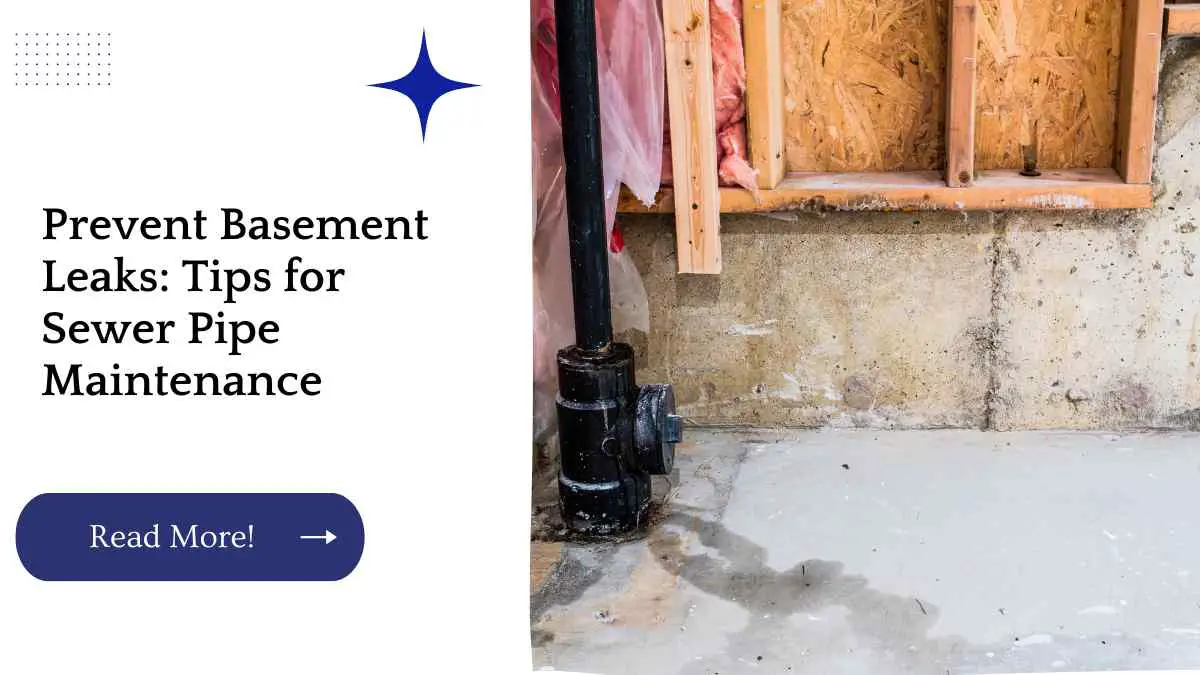Basement leaks can be a homeowner’s worst nightmare. One of the most common culprits of basement leaks is a malfunctioning sewer pipe. Preventing basement leaks due to sewer pipe problems requires regular maintenance and some basic precautions.
In this article, we’ll cover some tips for maintaining your sewer pipes to prevent basement leaks.
| Key Takeaways |
|---|
| Regular maintenance of sewer pipes can prevent basement leaks. |
| Responsible flushing and regular inspections are crucial. |
| Proper landscaping, sump pump maintenance, and rainwater management can help prevent basement leaks. |
| Promptly repairing any damage to your sewer pipes is essential. |
| If you experience a basement leak, it’s important to address the issue as soon as possible. |
Understanding Sewer Pipes
Sewer pipes are the primary means of removing waste and wastewater from your home. They transport the sewage to the municipal sewer system, where it is treated and disposed of properly. Your home’s sewer system typically consists of two main parts: the lateral sewer line that connects your home to the municipal sewer system and the main sewer line that runs beneath the street.
Signs of Sewer Pipe Problems
There are several signs that your sewer pipes may be experiencing issues. Some of the most common signs include slow-draining sinks or tubs, foul odors emanating from drains or the basement, gurgling sounds coming from pipes, and water backing up into your home.
A washing machine drain that is not properly installed can lead to major basement leaks. Check out our DIY tips for basement washing machine drain plumbing to prevent this issue from happening.
Tips for Sewer Pipe Maintenance
To prevent basement leaks due to sewer pipe problems, it’s important to maintain your sewer pipes properly. Here are some tips to keep in mind:
Flushing Responsibly
Flushing inappropriate items down the toilet can cause sewer pipe problems. It’s essential to only flush human waste and toilet paper down the toilet. Avoid flushing items such as baby wipes, feminine hygiene products, and paper towels.
Regular Inspections
Regular sewer pipe inspections can help you catch potential problems before they turn into major issues. Consider scheduling an inspection with a professional plumber every few years.
Leaking basement showers can lead to water damage and mold growth. Our article on quick and easy fixes for basement shower leaks provides solutions to this common problem.
Cleaning Your Pipes
Sewer pipes can become clogged with debris over time. Regular cleaning can help prevent clogs and keep your sewer pipes functioning properly. You can use a drain snake or hydro jetting to clean your sewer pipes.
Repairing Damage Promptly
If you notice any signs of damage to your sewer pipes, such as cracks, leaks, or tree root intrusion, it’s crucial to address the issue promptly. Ignoring these problems can lead to basement leaks and other issues.
Preventing Basement Leaks
In addition to regular sewer pipe maintenance, there are several steps you can take to prevent basement leaks:
Sump Pump Maintenance
If your basement has a sump pump, it’s important to maintain it properly. Regularly test the pump to ensure it’s working correctly, and consider having it serviced by a professional plumber every few years.
Proper Landscaping
The trees and plants in your yard can have a significant impact on your sewer pipes. Tree roots can invade sewer pipes, causing damage and potentially leading to basement leaks. Consider planting trees and plants away from your sewer pipes to prevent these issues.
- A washing machine draining into the sink can cause plumbing issues and unsanitary conditions. Learn how to fix this problem with our guide on washing machine draining into your sink: here’s how to fix it.
Rainwater Management
Excess rainwater can also contribute to basement leaks. To prevent this, make sure your gutters and downspouts are clear of debris and pointed away from your home’s foundation. You may also consider installing a rain barrel or other rainwater management system to divert excess water away from your home.
Dealing with Basement Leaks
If you do experience a basement leak, it’s important to address the issue as soon as possible. First, turn off the electricity in the affected area to prevent any electrical hazards. Next, remove any standing water and dry out the affected area thoroughly. You may need to use a dehumidifier or fans to dry out the space completely.
Once the area is dry, identify the source of the leak. If it’s due to a malfunctioning sewer pipe, call a professional plumber immediately to repair the issue. If the leak is due to other causes, such as a crack in your foundation, you may need to hire a contractor to address the issue.
Hiring a Professional
While regular maintenance can prevent many sewer pipe problems, it’s important to hire a professional plumber if you experience any issues. A licensed plumber can identify and repair any damage to your sewer pipes, ensuring your home remains safe and dry.
Finding the right drainage pipe for your driveway is crucial to prevent water from pooling and causing damage to your property. Consult our guide on finding the right drainage pipe for your driveway for tips on choosing the right materials and installation.
Further Reading
Here are some additional resources on preventing basement leaks and maintaining your sewer pipes:
Plumbing Tips to Prevent Leaks in Your Basement: This article offers some practical tips for maintaining your plumbing and preventing basement leaks.
Basement Tips and Maintenance: This blog post provides some helpful information on maintaining your basement and preventing leaks.
How to Protect Your Basement from Leaks: This article covers some of the key steps you can take to protect your basement from leaks, including regular sewer pipe maintenance and proper landscaping.
Conclusion
Preventing basement leaks due to sewer pipe problems requires regular maintenance and some basic precautions. Responsible flushing, regular inspections, and proper cleaning can help keep your sewer pipes functioning properly.
In addition, proper landscaping, sump pump maintenance, and rainwater management can help prevent basement leaks. If you do experience a basement leak, it’s important to address the issue promptly to avoid further damage. By following these tips, you can keep your home dry and safe for years to come.
Understanding PEX fittings and polybutylene pipes is essential for any homeowner. Our article on PEX fittings and polybutylene pipes: what you need to know provides valuable information on these widely used plumbing materials.
FAQs
What are the signs of sewer pipe problems?
Signs of sewer pipe problems can include slow-draining sinks or tubs, foul odors, gurgling sounds coming from pipes, and water backing up into your home.
How often should I have my sewer pipes inspected?
It’s a good idea to have your sewer pipes inspected every few years by a professional plumber.
Can I clean my sewer pipes myself?
While you can clean your sewer pipes yourself using a drain snake or hydro jetting, it’s often best to hire a professional plumber to ensure the job is done safely and effectively.
What should I do if I experience a basement leak?
If you experience a basement leak, it’s important to turn off the electricity in the affected area and address the issue promptly by identifying and repairing the source of the leak.
How can I prevent basement leaks?
Regular sewer pipe maintenance, sump pump maintenance, proper landscaping, and rainwater management can all help prevent basement leaks.

Hellen James is the author of the blog and a licensed plumber with over 15 years of experience. She shares her knowledge and experience in plumbing and drainage through insightful and informative articles

